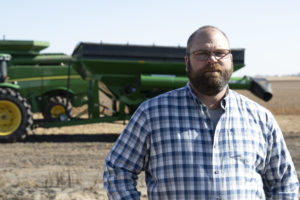
Partnerships That Drive Success
Guests: Todd Arduser, Kevin Poppel
In this episode of Channel Chat, farmer Kevin Poppel talks about the relationships and advice that have helped him find success in farming.
Listen to Episode
 Ag Over Easy Podcast
Ag Over Easy Podcast
Channel Seedsman Matt Jones’ love of agriculture is being passed down to his daughter, Morgan, as she shares her excitement about interning with a Channel Seedsman this summer. Morgan’s friend, Megan Wollgast, had the same opportunity last summer when she interned for Matt. The two FFA students attend Elsberry High School in Missouri and are passionate about everything agriculture. Hear all about it in this episode of Channel Chat!
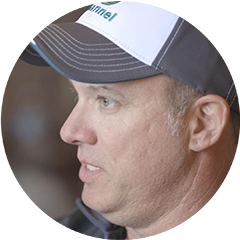
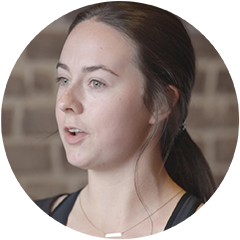
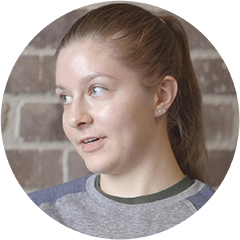
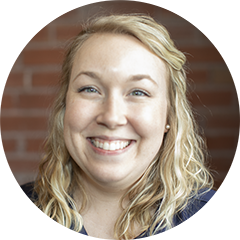
Amity:
Hi there. Welcome back to Channel Chat, season two. I'm your host, Amity Shedd, and today we're so excited to be in Elsberry, Missouri, hanging out with Channel Seedsman Matt Jones his daughter Morgan and their friend Megan Wollgast.
Morgan and Megan actually go to high school together, and they're both in FFA and members of the agronomy team where they've both been very successful with different projects and contests. Last summer, Megan actually spent a lot of time with Seedman Matt doing an internship and scouting fields for him. And then this summer, his daughter Morgan is going to be doing a very similar internship in Hawk Point, Missouri, with Channel Seedsman Kyle Allen. All three are very involved and excited about agriculture. So let's meet our guests starting with Matt.
Matt Jones:
Hi, I'm Matt Jones, a Channel Seedsman from Elsberry here in Missouri, and we've been with Channel for six years.
Morgan Jones:
I'm Morgan Jones. I go to EHS and I'm a sophomore and I'm 16 years old.
Amity:
Welcome.
Megan Wollgast:
I'm Megan Wolgast. I'm 18. I'm a senior at Elsberry High School, and I interned here last summer and I plan to do so again.
Amity:
You interned for?
Megan Wollgast:
For Matt Jones.
Matt Jones:
Yes.
Amity:
And you two are friends?
Morgan Jones:
Yep.
Amity:
You go to the same school. Awesome. Well welcome. We'll start off with a little bit of background of when did you, Matt, join into Channel Seed and how long have you been with them and what do you do?
Matt Jones:
So we had the opportunity presented to us to become a Seedman six years ago. We had met the district manager through actually at an FFA contest. I was helping judge an ag sales contest, and he'd come to me and asked if I was interested and I thought, well sure we'll give it a try. And six years later we're at where we're at today, and it's been a really good ride. We've seen the company grow and we've seen our individual company grow, and it's been a really good experience with the brand as a whole. Channel's afforded us the ability to be able to grow our business and move in the right direction and give us the technical help on the backside that we need in order to number one, help our clients and number two grow our business.
Amity:
OK. And do you girls want to talk about your involvement in whatever activities you do at school, whether it's FFA or I think, did you just say Agronomy Club, is that what I heard? OK.
Morgan Jones:
Agronomy contest.
Amity:
Agronomy contest. Yeah. Do you want to talk about that a little bit?
Morgan Jones:
Yeah. Agronomy goes through FFA, so basically they put on these contests every, it's like a contest season toward the end of the year where we go to different schools and you compete. There are all different types of teams, but we've both done agronomy. I'm doing it this year and she did it last year.
Megan Wollgast:
So, our team, we got first at state last year. I got second-highest individual and we went to nationals. We got fourth at nationals.
Amity:
That's amazing.
Megan Wollgast:
We had to identify plants and seeds. We had to do practicums on fertilizer analysis and things we had to do with fields. We had to judge hay and vegetables and machinery and pretty much everything under the sun. We did it with agronomy.
Amity:
That's great.
Megan Wollgast:
This year, I'm on entomology and we got second at districts, but we're looking to win first at state. That's what we're going for.
Amity:
That's awesome. And what are you working on?
Morgan Jones:
Yeah, well, I'm working on agronomy at the moment. We just had districts and we won first there and we're hoping to get first at state to move on to nationals like them last year.
Megan Wollgast:
I think they can do it though ’cause they're beating all the other teams by, like, 200, 300 points. They're doing good.
Amity:
So what was it like for you girls? Are you both from the area, born and raised here?
Megan Wollgast:
Yeah.
Morgan Jones:
Yeah.
Amity:
So what was it like for you guys growing up with, I'm assuming an ag background, especially you, with your dad and everything. So how did that influence your decision to get into that kind of stuff at school?
Morgan Jones:
Yeah, definitely. I feel like having him be a part of, you know, Channel and stuff, it's like, well I kind of want to know more. Maybe I should do agronomy, I could learn some and it might open a new door for me in the future.
Megan Wollgast:
Mine is a little different. None of my parents really do a lot of farming necessarily. My dad's a machinist and my mom, she stays at home with my siblings. But my grandparents, they own a lot of farms and we own a lot of acres. We grow wheat, soybeans, corn and so I've lived out here my whole life, but I went to a private school in Troy, so they didn't offer FFA or any programs like that.
So when I got to Elsberry High School, they had FFA and my grandpa, he was really encouraging me like, "Hey, you should get into this because no one else in our family is going to be able to take over the farm." So, I got into it and agronomy, I started out doing speaking contest because I was like, well that's the only thing I really know how to do. I don't know anything about farming.
So then my ag advisor, he told me, he's like, "Hey, you should do agronomy."
I was like, "What's that? I don't even know what that means."
He was like, "Oh, it's just plants."
I was like, "OK, cool." And I did that. And then after I did agronomy, I realized it's not just plants, it's so many things. And through that, I was offered the opportunity to intern with Matt over the summer, which was really fun and I enjoyed it a lot. And I learned a lot with it, a lot about plants I never knew before. And My grandpa asks me questions to this day about, "Hey, I saw this on the corn, what is that? Can you tell me what that is?" I'm like, hey, I actually know what that is.
Matt Jones:
I still have to ask her questions. They know more about agronomy then I do.
Amity:
Can you talk a little bit about her internship and how she helped you out?
Matt Jones:
Yeah, so I had talked with the local FFA advisor, Mr. Vandervort, and we'd kind of hatched this plan, and really neither of us had followed through with it. And he called one day and he said, "Hey, you know, if you're still interested in that, Megan, I think, would be a great candidate for that position. And I said, "Sure, send her on down."
After talking with her for 10 minutes, I said, “Yeah, this is going to work out great.” I'll be the first to admit that I'm probably not the best as far as delegating responsibilities or showing people how to do things. And especially at the time when she came, we were in the middle of the seed season, and she gets here and I just don't have the time.
So I kind of let her sink or swim on her own. And I, she, she was doing the backstroke around everything. I mean, she really, really took into the position. I'm older and so the computer side of it is a little tough for me at times. She handled that brilliantly. And it was awesome to watch and really helped me out a lot in that end.
And, you know, basically what we had, because she already had the agronomy background from being on the agronomy team, it was a real good fit to go out and start scouting fields. And so we had that back into our Field Check Up Series, and then also in that formulating back into Climate, she was able to enter that information on the computer. We'd kind of discussed it a little bit when she got back.
And then I was shooting the emails to our customers saying, "Hey, here's what we saw on your field. You need, you know, you might have a problem or your things look good." So it was really eye-opening and really fun. I had fun. It took a lot of pressure off of me. I would not walk in fields nearly as much as I had in the past, but you know, I think it gave Megan the opportunity to really see you can learn a lot out of a book, but being in the field and seeing the different things that happen from time to time is really a lot more experience. And so, you know, if it could give her a better idea of what she wants to do down the road, that's great. And it helps me out at the same time.
So it's been a really good situation. So the other Channel dealer on the other side of the county had called and he said, "Hey, how'd it go with Megan?" I said, "Man, it was great. It was beautiful." And he said, "Well, I think I'm going to do the same thing this year." He called me back two months later, he said, "I cannot find anybody to fill this position." So he said, "Would Morgan want to go to work for me?" And so after a couple of discussions we said yeah, so instead of working for her dad, she's going to go to work for the other Channel dealer on the other side of the county, which is great — I think that'll give her a different view, and maybe she can steal some secrets and bring them back to me.
She's going to tell me how I'm doing it wrong at the end of the day, but you know, and looking forward, looking down the road, you know, I think this is something we'll continue to do so long as they have valid students that want to come out and really want to possibly look at an agronomy career from the team. It's a good opportunity for them. And I think, you know, I think it's a good situation. I was in FFA, and FFA gave me a lot of the groundwork for who I am today and how I am. And I feel like, you know, it's a great program that we have here locally. We're blessed with two great ag teachers and I'm involved with the school. I'm on the school board and different things.
So we see that program flourish and blossom underneath their control. And I'm just, I don't know, we're still yet to see what's in store. But if it goes as good as this, it's going to be great.
Amity:
That's awesome. How are you feeling about it, Morgan?
Morgan Jones:
The internship? I'm stoked about it. I'm glad to see something new ’cause it's always the same. When you're in a small town, it's kind of hard to get out, but if you get these chances to go out and experience these different things, I feel like it's just a new way to learn something new or open a new door for your future and go to college for this maybe someday or get a job opportunity.
Amity:
What do you love about or what is interesting about ag to you? Why are you, you don't have to do it. You don't have to be so involved in it. Why are you, what is so intriguing about it?
Morgan Jones:
I think what's intriguing about it is that it's open to everything. Like certain fields, they're limited to different aspects. Like, I don't know, if you're a machinist, you're limited to parts, things like that. If you're a cook, I mean all you do is cook usually for the most part. But with ag, you can do anything under the sun. You can go into a field in chemistry, you could focus more on biology, looking at plants, or you can go into veterinary science, do more animals. You can even be, like, a mechanic and work on ag equipment. So I think it's interesting because no matter what you enjoy as a person, there's an opportunity in ag that you can find.
Megan Wollgast:
And I feel like it's almost like a family, like in the community that's more ag, agricultural-based — it's like everyone understands. And especially in FFA, it feels like you're in a big family. It feels like you're part of something that's, like, you're welcome into something.
Morgan Jones:
That's true too. Even going off what you said, because I've gone all over the country and just on various trips and things, and I met people out there and I talked to them and I'd be like, "Oh yeah, I've been in FFA," and they're like, "Oh you've been in FFA? I've been in FFA, too." And then we'd kindle a connection based on that, based on agriculture things. And I don't know. Like she said, it's a big family. You can find people everywhere under the sun.
Amity:
What about you, Matt? What do you love about it and how does it make you feel? This is a two-parter question. How does it make you feel?
Matt Jones:
Well, that was a great answer. Perfect answer from both of y'all. And so me, you know, my parents, neither of my parents farmed; my grandparents did or my grandfather did, and that was just a draw to me. I just always wanted to be in the agriculture field. It's just an enjoyable set of people. You know, you're dealing with a lot of the same people, but you're meeting new people at every juncture. And it's been, I've been into other industries, construction and into the insurance side. And somehow or another, I keep coming back to agriculture and it's just a smaller town atmosphere and an enjoyable thing.
You know, her mother and I are very against pushing her in any one shape or direction. And we want her to find her own way and enjoy and love what she does.
And the same for you, Megan, even though you're not my daughter. But it is, you know, if you enjoy your job, you'll never work a day. And so, to see her kind of start to ease into it, and you know, I kind of wanted her to go into FFA because I believe that FFA creates a lot more of an opportunity for a kid to grow over and above sports.
I think sports are good, but FFA really, the speaking ability and the ability to talk to new people and be put in uncomfortable positions and how to handle those, which everybody's going to need those down the road. And so when she wanted to go into FFA, I thought that was great. And then she wanted to go on the agronomy team. I thought, OK, this is going in a great direction and I couldn't be more proud of her for what she's done on the agronomy team.
You know, and not by much coaching of my way. Like I said, she probably already knows more than me. It's fun to see. We walked out the back door last week and just started walking through the field, and she's naming the different weeds that we're seeing, and that was just enjoyable to see and watch. And, you know, I've always told them they can be a part of this as much or as little as they want to. But the fact that she's kind of not chosen but is enjoying it as she goes along the way has meant a lot to me.
Amity:
That's awesome. How do you think that comes into play with them being in the field with you, you learning from him? What part did Channel Seed play in that besides the internship?
Matt Jones:
It's awesome to see, you know, a young person take it and run with what you're handing them. And it really wasn't Channel’s idea. It was just kind of a, well yeah, let's see what happens. You know, throw something at the wall and see if it sticks. And it really has. And I think we'd be doing it regardless of what we were doing. You know, we're in a small community, there's not a whole lot of job opportunities, so anything that I can do to give back into the community and along with an internship. But I'm gaining off of it too, don't let me kid you that it's all volunteer work on my end. I'm gaining, but giving a kid an opportunity, I mean it's, I wish I'd had ... I washed cars when I was growing up, mowed lawns. So I wish I'd had an opportunity like this to actually be involved in a day-to-day business of an agriculture business.
Amity:
And that kind of leads into my next question of what you three have learned from each other, whether it's you learning from your dad or you learning from Megan on the internship. What are you guys learning from each other throughout this process?
Morgan Jones:
I'm definitely learning agronomy from them, last year especially. We're following in their footsteps. They kind of laid the path for us with nationals. They were the first team, you know, and then him, of course, I learned everything. Every day he comes home, he talks about his day or whatever and you just hear, I just hear all these things about how like all these opportunities that are happening out in the agricultural world.
Megan Wollgast:
Well, with me, just being here as an intern, I learned a lot because I learned a lot in agronomy. But I mean, it was just on paper and books and like you said earlier, you don't really learn a lot more until you actually get out in the fields and experience it yourself. And there were many times that he brought an agronomist up or I'd just go out with him on runs, especially toward the beginning when I was kind of learning how to do what I needed to do, and he'd go up to and be like, "OK, this is compaction or this is gray leaf spot." And I'm like, oh, I recognize that. But now that I see it in person, it makes a lot more sense and then a lot of things I also learned, I applied to my contest.
Now I'm on entomology, which is insects and a lot of damage that I saw in fields, like well, I know this is insect damage, but I don't know exactly what insect damage. And now that I'm doing entomology and we have disorders where they have damage and we have to identify, I'm like, “Oh, I've seen that before, I know what that is.” And now I know what insect it is.
And at the same time, with all the technical things with agronomy, a lot of people, they go to work and they come back like, ah, yes, works done, can't wait for the weekend and everything. With him, I never had that impression at all. He comes in every day, he's always happy and I never, I love coming into work, like you can ask anybody that I know. They'd be like, “Oh yeah, Megan, Megan loves work.” Because he'd always make it fun for me. Yeah, I had a great time, and I'm excited to come back this summer too because I never feel like it's work. It's fun. I like it. It's enjoyable.
Matt Jones:
That's great. Well, and thinking about that, what I've learned from both of them, you know ... In today's society, you hear about the younger generation not willing to work and not willing to, you know, they only want to show up and get a paycheck. And Megan was way outside of that. She came to work and put forth her full effort every day, and it was amazing to watch. I really, truly enjoyed the fact that she came to work and put in the effort.
She just wasn't here just to stand around and say, “Hey, I had an internship.” She wanted to be deeply involved with it. There were times when I was busy and didn't have a task at hand for her. She'd go find a task. She'd go look something up on the computer and and say, "Hey, this is what I found on this. What do you think?" And we'd start to interact, and that caused me to interact back and forth. And so it kind of restored my faith in the younger generation that they've got the ability and the drive to go out there and work and work hard for things. ’Cause it's, once again, not necessarily work, but if you're enjoying doing it and you're having fun, you don't have to come to work every day, and it was enlightening to say the least.
This one [Morgan], we'll find out where... no, she's [a hard worker]. You know, and what she's taught me is not to pigeonhole. Just because her dad's a Seedsman doesn't mean she has to go that route. If she wants to, she can. But I think it's allowed her to make some, especially being in FFA, to take some of those risks that maybe she was nervous about doing before. Now, there were several times in years past where I'd say, "Hey, do you want to do this?" "No, I don't want to do that," because it's outside of her comfort zone.
She really has no comfort zone anymore. It's pretty much, yeah, let's do it.
Morgan Jones:
You go all the way.
Megan Wollgast:
She's very enthusiastic and I think she helps get her team hyped up, so to say, because she's always like, “Yes, agronomy, we did so good, first place, yes!” And the whole team is like, “Yes.” And so we'll be able to go into a contest and everyone will be on the bus or whatever. We'll be sitting, it's early in the morning, we leave here at 5:00 to go to someplace an hour and a half away. And we get there. And I just, I look at my girls on my team and I'm like, "Who is ready to go win this thing?" And we're just going, we get pumped and we get ready and we get excited and that's good because sometimes contests can be discouraging, especially if we know there's going to be difficult competition there. And ’cause, I mean, I talked about what I learned from that, but definitely from Morgan, like she is enthusiastic and she made, I'm not even on the same team as her, but I'll hear her like laughing and stuff. I'm like, man, let's go. We're going to win this too, everyone's going to win this.
Amity:
I'm pumped now.
So where do you guys, what are you thinking for your future? I know, Morgan, you're still a sophomore in high school, but you're probably thinking, “I have a little bit,” and you're a senior, so what are you guys thinking? Are you going to stick to ag or what are your plans?
Megan Wollgast:
Well, I'm going to Truman State University in the fall and-
Amity:
I went to Truman. Nice choice.
Megan Wollgast:
Oh you did? Awesome. So I'm going in for chemistry and then I might move over into exercise science and like the health aspect of it, like nutritional science. But I'm not sure if that's exactly where I want to go, but I know something to do with chemistry, so I can easily do that. Or I could go into agriculture because I've considered that, too. So definitely chemistry.
Amity:
And they're related. They have a connection. Yeah.
Megan Wollgast:
So chemistry is a start, but from there, I'll figure that out in college. I guess that's what it’s for.
Morgan Jones:
Yeah, I've definitely been, I've been all over the place with what I want to do and there's definitely not something set. But I think that getting exposed to agronomy in this internship, it allows me to see if I like that. And so far I have, so it might; it's definitely a consideration for me and my future.
Amity:
Right. I guess the summer you'll probably have a better idea after you do your internship.
Morgan Jones:
Yeah. Definitely.
Matt Jones:
Oh, we always told her, you know, “If you don't go down a road, you don't know whether you want to go down that road or not.” So you kind of got to head down the road, and if you like it, you know ... I've got a degree in agriculture mechanization, so here I am, on the agronomy side and insurance side. So you don't have to have a degree in what you're going to do. I've been through several different fields.
Amity:
Yeah. And what do you see for your future? We can't leave you out of this. The future of ag, future of your business, future as a Seedsman.
Matt Jones:
If her or her brother don't want to take this over, there's going to be a … I got about 20 years of selling seed and about another 30 years of selling crop insurance. And then I'm just going to farm for the rest of my life. So I figured if I farm till I'm 85, then I'll be all right. So yeah. But no, no, we're just, you know, we're at the size now where we like and we want to maintain and we want to do the right job at servicing the customer base we have at this point in time. Getting much bigger is probably not necessarily the thing that I want to do. I want to do the best at my job that I can rather than being bigger and not taking care of the guys that I take care of. So, we're pretty high on customer service around here. So that's the key to our business I think.
Amity:
OK. I have one last question for each of you. What is your favorite part of your job, Matt, and your agriculture work thus far? What's been the best moment? What's your favorite part? Whoever wants to start.
Matt Jones:
That's going to be tough for me — there are 25 years worth of or 30 years worth of [it].
Megan Wollgast:
With me, I don't know.
Matt Jones:
Maybe winning state?
Megan Wollgast:
I mean, that was really fun for us. Even doing well at nationals. Like there are so many memories that are really like, I love them. I love different things. But I think as a whole, my favorite isn't necessarily a specific memory, but it's just like the atmosphere. Just being outside, not sitting at a desk all the time, just kind of doing what I love and just the atmosphere. I think that's my favorite part of it.
Morgan Jones:
Definitely the same thing. I love the atmosphere that I'm around in FFA and agronomy and all this. But I think if I had to choose a memory, I think it would definitely be when I found out I got first-time individual on agronomy at districts. It was like all of my hard work had done something, and you can see the results after you do this and you work hard and you put in the time and effort that you can learn something new. And toward the beginning of the season, we would look into something and we'd be like, what is that? Now it's like, oh, it's this, it's that. I know what this is, I know what it is. And to see my growth is so amazing just for myself.
Amity:
Wow. You have to top that.
Matt Jones:
Hell, that's what I'm most proud of right there. That's, you know, granted the kids and everything else. And you know, I spend a lot of time away from these guys during seed season and crop insurance season and everything else. And, and I don't know. My best moment? There have been there 30 years, I've had a lot of moments, you know. FFA contests when I was younger and going to nationals and competing, and I don't know, I've just been fortunate is all I can say, I really have.
I've had a great life. It's been a great ride. I enjoy what I do every day, and I hope it shows in how my customers react to me, and every day is fun. It would be really hard for me to single out one top thing. There are good days and there are bad days, like everything but my good days will far outwin my bad days.
Amity:
Well, their excitement and your enthusiasm are very contagious.
Matt Jones:
Good. We hope. We hope.
Amity:
Well, that's all I have for you guys. Thanks so much for joining us on this episode, and we'll see you next time.
What a fun conversation we had today with Matt, Morgan and Megan. Morgan and Megan blew us away with her enthusiasm and excitement for agriculture, and we can't wait to see what the future holds for the two friends. Now grain marketing consultant Matt Bennett continues his conversation on bin management when it comes to your farming operation.
Matt Bennett:
This is Matt Bennett, the grain marketing consultant with Channel Seed, and coming to you in the second part of our series discussing bin management and how we can make the most of our bins. We have talked previously, a little bit, about [how in] the last several years [there] has been a lot of storage built here in the U.S. from that era from about 2007 to maybe 2013 or '14. They certainly saw U.S. producers generate some wealth. We had commodity prices that we weren't accustomed to, and certainly we're able to see producers net farm income go up substantially.
And so, you know, we invested a lot in equipment and a lot of different things. But one thing that we certainly saw happen was storage went up all over the place. And so a lot of producers, as I talked about in the previous episode, wanted to build bins for speed of harvest. And I certainly understand that. The elevator might close at 6 o'clock or 7 o'clock at night. And you want to, if you've got enough help, and typically we all have a little bit more help in the evening time frame, we'd be able to run just a little bit longer. Especially if you got a rain on the way.
And so, that's the way, the reason, a lot of folks built bins partially, but at the same time I think sometimes we miss the point. Growing up in an elevator family, I can tell you that the way that we made money typically as I got older and was able to really understand the business wasn't necessarily on storage rates by any means or drying income. The way we made money was whenever we had carry in the market, we would sell carry and then we would end up waiting on basis to come around.
Even when we didn't have carry in the market as an elevator, you can't retain ownership of that corn. So you have to transfer it to paper. So we would end up transferring it to paper and still waiting on the basis to come around. Now, whenever you're looking, you know, at basis for instance, or if you're looking at carry in the market, if the market upfront is higher than prices down the road, you've got an inverted carry in the market.
Essentially, the market is saying we need the corn right now. And so you might think, well shoot, I don't know if I want to put it in the bin. But it's actually still a pretty good idea to put it in the bin because the bottom line, if corn is short, then down the road, people might be paying overs for corn. Whereas, maybe you're not necessarily used to seeing someone pay over or if you're used to a dollar under in parts of the Corn Belt. But maybe you're going to see 50 under. And so there's no question that whether you're looking at an inverted marker or a normal, healthy carry in the market, there are still opportunities.
Now, one of the main things we like looking at is what does it look like whenever you're trying to take advantage of carry in the market. And so, you know, if you can see a 30-cent carry for instance out to the July, then you know, bottom line is you can sell that July. Maybe December corn is $3.80 at the time, but you can sell July corn at $4.10.
What's most likely to happen is that the basis is going to improve the closer you get to July, and that doesn't mean you have to sell your corn in July. But the bottom line is this: We're going to try to sell our corn whenever the market's asking us to sell our corn. So we're going to try to wrap this all up and put this all together here in the third and final episode that I'm going to put together whenever it comes to bin management. Again, this is Matt Bennett, and I'm the grain marketing consultant with Channel Seed.
Amity:
Thanks for listening and don't forget to subscribe to this podcast to hear more from season two of Channel Chat. Learn more at channelpodcasting.com.

Guests: Todd Arduser, Kevin Poppel
In this episode of Channel Chat, farmer Kevin Poppel talks about the relationships and advice that have helped him find success in farming.
Listen to Episode
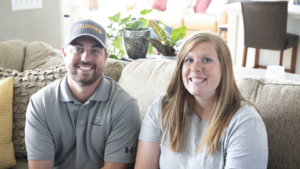
Guests: Colby Woods, Jessica Grubbs
As technology in agriculture continues to evolve, Channel Seedsman Colby Woods wanted to get ahead of the pack and offer drone scouting to his farmers in Eastern Nebraska. We caught up with Colby in Wahoo, Nebraska, along with Sentera Sales and Training Specialist Jessica Grubbs. Listen in this episode of Channel Chat.
Listen to Episode